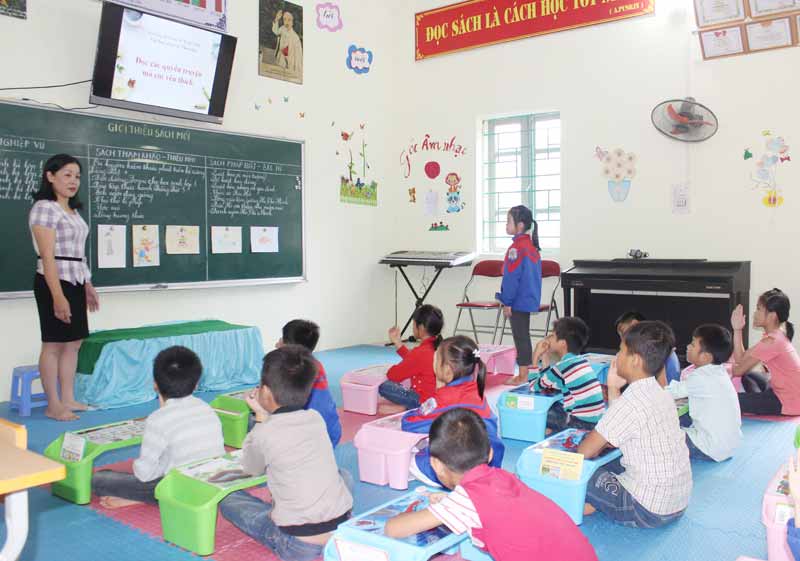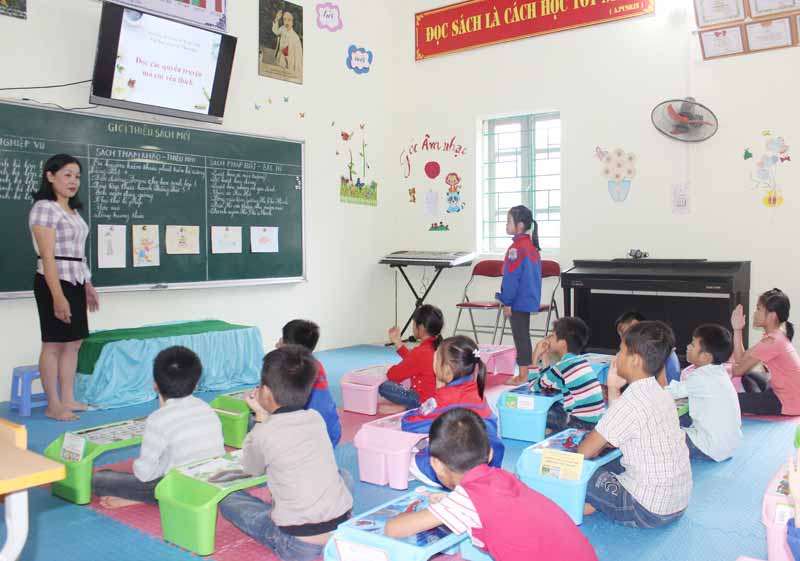
(HBO) – To boost the use of information technology (IT) in teaching, all educational establishments in the province have access to the high-speed Internet, with 82.6 percent using broadband connection and the remainder using 3G; 84.4 percent of schools have their own Local Area Network (LAN) and wifi connection. Some 55 percent of general schools have computer labs while 47 percent have multi-media conference rooms.
 Library of Kim Tien Primary
and Junior High School in Kim Boi district uses information
technology to improve its operational effectiveness.
Library of Kim Tien Primary
and Junior High School in Kim Boi district uses information
technology to improve its operational effectiveness.
The province also
aims to enhance IT application in management so IT-based management services,
including email, website, online meeting, have been well maintained and
upgraded to meet the demand of the province’s education sector. A database of the education and
training sector has also been developed and effectively exploited.
All local schools
have employed school management systems such as SMAS and Vnedu which have
helped provide information for educational authorities to develop educational
policies and plans.
Additionally, IT
has been applied to innovate teaching methods. About 9 percent of classes were
taught with IT support. A database of e-learning lectures have been compiled and uploaded to the Internet for
teachers and students to access easily.
About 87 local
junior high schools have been
participating in YouthSpark Digital Inclusion project which engages in developing
computer science skills for the students. The provincial Department of
Education and Training has piloted a project providing students in Mai Chau
district with Micro:bit-based technology experience. The project’s results are
very encouraging with the introduction of 30 products. The 30 products are very
creative and applicable, four of which have competed in the provincial science
and technology contest.
Dinh Thi Huong,
Deputy Director of the Department of Education and Training, said IT application
in teaching is regarded as a key factor encouraging students to learn and
sharpen their skills proactively.
It also helps teachers improve their creativity and flexibility in teaching./.
The emulation movement "Hoa Binh joining hands to build new-style rural areas” has been widely spreading, becoming a driving force that motivates the localities to renew rural landscapes and improve the material and spiritual lives of the residents. In this movement, the people play a central role-both as the main implementers and direct beneficiaries of its outcomes.
In response to the global digital revolution, Hoa Binh Newspaper is transforming itself into a modern and multi-platform media hub, blending cutting-edge technology with a restructured newsroom and a new generation of tech-savvy journalists.
Hoa Binh province’s Association of the Elderly recently held a conference to review the project on expanding the inter-generation self-help club model until 2025.
In a move to implement Resolution No. 57-NQ/TW, issued on December 22, 2024 by the Politburo, which targets breakthroughs in science-technology development, innovation, and digital transformation, the Hoa Binh provincial Department of Health has issued a plan to roll out the "Digital Literacy for All” campaign within the local health sector.
An Nghia Commune (Lạc Sơn District) is one of the communes that achieved the tha standard of the national new rural area in 2018. Entering a new development phase, the commune is now trying to meet the criteria for the advanced new rural development. With the strong political will and the public consensus, the commune is gradually overcoming the challenges to reach this goal, aiming for the sustainable development.



 Library of Kim Tien Primary
and Junior High School in Kim Boi district uses information
technology to improve its operational effectiveness.
Library of Kim Tien Primary
and Junior High School in Kim Boi district uses information
technology to improve its operational effectiveness.